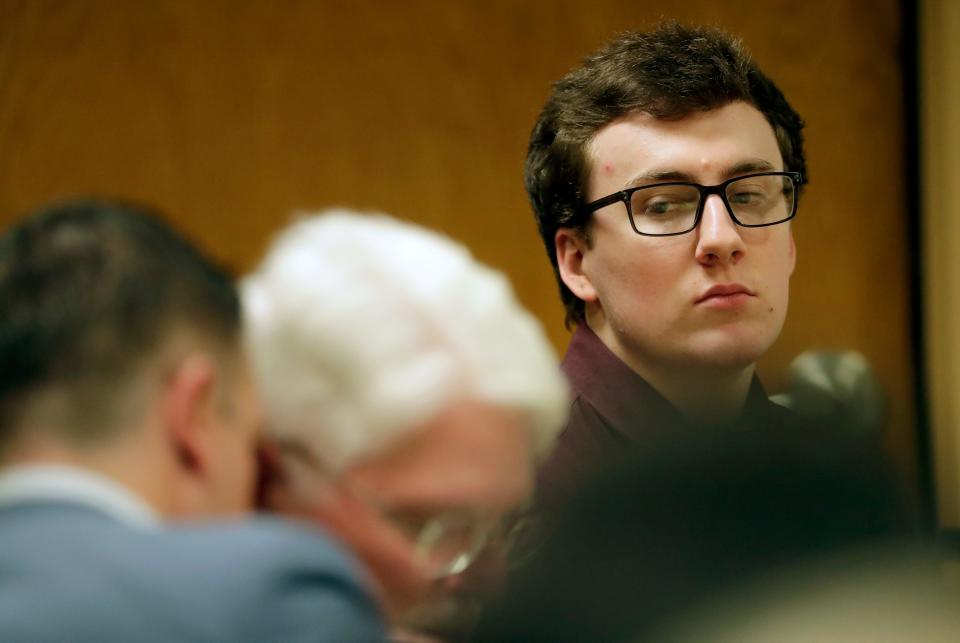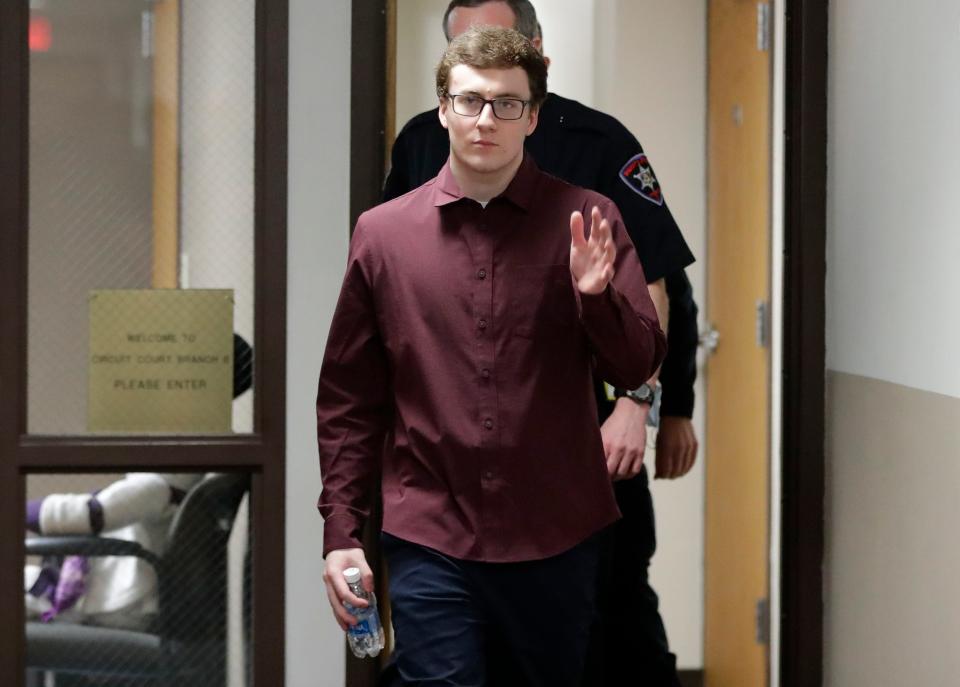Defense argues former Oshkosh West student charged with attempted homicide did not try to kill officer but was suicidal
OSHKOSH – After six days of prosecution witness testimony, defense attorneys for Grant Fuhrman began calling witnesses Wednesday in an effort to dispute the prosecution's argument that Fuhrman tried to kill an Oshkosh West school resource officer when he attacked the officer with a barbecue fork the morning of Dec. 3, 2019.
The defense argues Fuhrman's actions that day were not homicidal, but a suicide attempt.
Fuhrman, 20, is on trial for attempted first-degree intentional homicide for attacking Officer Michael Wissink with a two-pronged grilling fork he brought to school that morning. In response to the attack, Wissink fired his gun three times, striking Fuhrman in the chest and himself in the wrist.
At the time a 16-year-old junior at Oshkosh West, Fuhrman was arrested immediately after the incident and has been in jail since. His trial started Jan. 23. If the jury finds him guilty, Fuhrman could be sentenced to up to 60 years in prison.

Behavior change raised concerns
Among witnesses the defense called to the stand Wednesday were Tina Kintopf, Fuhrman's mother, and Liz Van Engen, an Oshkosh West teacher who worked closely with Fuhrman throughout the fall 2019 semester.
Van Engen taught Fuhrman in a self-contained classroom for students with additional academic and behavioral needs. Fuhrman, who was diagnosed with ADHD around the time he was in kindergarten, struggled academically and during his sophomore year moved to the self-contained classroom, where students remained in one room with the same teachers all day rather than switching rooms and teachers between periods, Kintopf testified.
Van Engen said since the beginning of the year, Fuhrman was a "very active kid" with "a skip in his step," who was well-liked by other students in the classroom. But one day in November, Van Engen noticed "a dramatic change" in Fuhrman's behavior. He came into the classroom quietly, wasn't smiling and went directly to his desk.
"That was very uncharacteristic of him," Van Engen said.
When Van Engen and another teacher asked Fuhrman about how he was feeling, Fuhrman told them he had started a medication that made him feel sick, and that he was not sleeping and eating.
As that behavior continued for multiple weeks, Van Engen said she was "extremely concerned" and asked school staff to reach out to Kintopf about Fuhrman's medication side effects. She testified that she raised these concerns "within the week" before Dec. 3, 2019, and nothing was done.
When Van Engen interacted with Fuhrman during first hour on Dec. 3, 2019, he made statements that only stood out to her after the shooting, which occurred shortly after Fuhrman left the classroom between first and second hour.
"At one point I had asked him a question or a statement, and he responded to me, 'I won't be here.' At that point I didn't really think anything of it ... later on in the class period I had said something to him something again, and again he responded the same thing, 'I won't be here,'" Van Engen testified.
Within a week following the incident, Van Engen visited Wissink in the hospital. She said she was "struggling, much like everyone else was" in the aftermath of the shooting, and Oshkosh West Assistant Principal Becky Montour, who was Wissink's girlfriend, invited Van Engen to speak with Wissink about her concerns.
"I wanted Mike Wissink to know that I felt in my opinion that Grant wanted Officer Wissink to shoot him to kill him, and that's why he did what he did," Van Engen said.
During Kintopf's testimony, she discussed her son's upbringing.
When Fuhrman was 2 years old, Kintopf said, his father died by suicide. Fuhrman and Kintopf’s other son were present when Kintopf found her husband.
"After that, he was just very clingy. He was afraid of me leaving, he didn't want me to go anywhere," Kintopf said. "And he was very fearful of firetrucks and ambulances. He would just shake and get very emotional when he would see things like that."
As Fuhrman grew up, he was diagnosed with ADHD and took medication for it off and on. Kintopf said she was given permission by Fuhrman's doctor to take breaks from giving Fuhrman his medication when he was not in school, or periodically if he was having a "bad day."
"He had so many reactions to the medication, he would sometimes cry that he didn't want to take it," Kintopf said. "He couldn't sleep, he was not hungry, he had problems gaining weight. ... He was irritable, he was paranoid, he was crabby, couldn't control his emotions."
Fuhrman stopped taking his medication for an extended period of time during his sophomore year of high school, before he started taking it again in November of his junior year, Kintopf said.
Defense attorneys have presented testimony that Fuhrman was experiencing multiple stressors in his life around November 2019 — including the reaction to his medication, the recent death of his grandfather, finding out he would not be able to go out for football due to his academics, and a breakup with his girlfriend.
Fuhrman's former girlfriend was among the prosecution's witnesses to testify Monday. She said she and Fuhrman had broken up the day before the incident, and that they exchanged multiple text messages that night. Messages from Fuhrman stated that he wasn’t able to sleep and was searching for support.
During cross-examination, Fuhrman's former girlfriend said she and Fuhrman had both talked about suicide during the course of their relationship. The defense presented a text message conversation between Fuhrman and his former girlfriend from about two weeks before the Dec. 3, 2019, incident in which she expressed suicidal thoughts.
While Kintopf said she was not aware of Fuhrman experiencing depression in fall 2019, she said her sons did not openly share their emotions.
"It was very hard on all three of us after his father passed away, and I don't think they wanted me to ever worry," Kintopf said. "If they had any feelings like their dad had, they would never have told me that."
On the witness stand, Kintopf tearfully told the jury Dec. 3, 2019, was the worst day of her life.
“He went to school that day and he’s never been home since,” she said.

RELATED:First week of Grant Fuhrman trial saw testimony from school resource officer, evidence disagreement
RELATED:Testimony begins for former Oshkosh West student accused of attempted homicide
'Intent to kill'
For the jury to find Fuhrman guilty, Assistant District Attorney Tracy Paider must prove to them two things: that Fuhrman intended to kill Wissink, and that he would have killed Wissink if not for some sort of intervention or outside factor — in this case, Wissink shooting his gun.
In Wisconsin law, "intent to kill" means Fuhrman either meant to cause the death of Wissink or was aware that his behavior was “practically certain” to result in Wissink’s death.
Defense attorneys Corey Mehlos and Tim Casper aim to prove that this is not the case. Judge Daniel Bissett's pretrial rulings limited some of the evidence they had hoped to present — including testimony that Fuhrman was involuntarily intoxicated at the time of the attack due to his high dosage of ADHD medication and decreased tolerance from taking it on an irregular basis.
Beyond pointing to suicide as Fuhrman's intention for the attack, Mehlos and Casper have presented other evidence to dispute the charge of attempted first-degree intentional homicide. Doctors have testified that Wissink's only potentially life-threatening injury besides his gunshot wound to his wrist was an approximately 3-centimeter laceration to his neck, which Fuhrman's attorneys argue cannot be proved to have come from Fuhrman's fork and not some other thing in the office during Wissink's and Fuhrman's altercation.
Additionally, Mehlos and Casper pointed out that out of a knife block in his house's kitchen filled with multiple sharp knives of various sizes, Fuhrman selected a two-pronged serving fork. Investigators also found multiple knives in Fuhrman's room, including a pocket knife and a hunting knife. Fuhrman chose the weapon to bring to school that day specifically for a nonlethal purpose, his attorneys argue.
Although the trial was set to last three weeks, attorneys anticipate closing arguments to take place Friday, a week ahead of schedule. Fuhrman may or may not testify Thursday.
If you or someone you know is dealing with suicidal thoughts, call the National Suicide Prevention Lifeline at 988 or text "Hopeline" to the National Crisis Text Line at 741-741.
Contact Kelli Arseneau at (920) 213-3721 or karseneau@gannett.com. Follow her on Twitter at @ArseneauKelli.
This article originally appeared on Appleton Post-Crescent: Defense: Oshkosh West student was suicidal, not trying to kill officer

